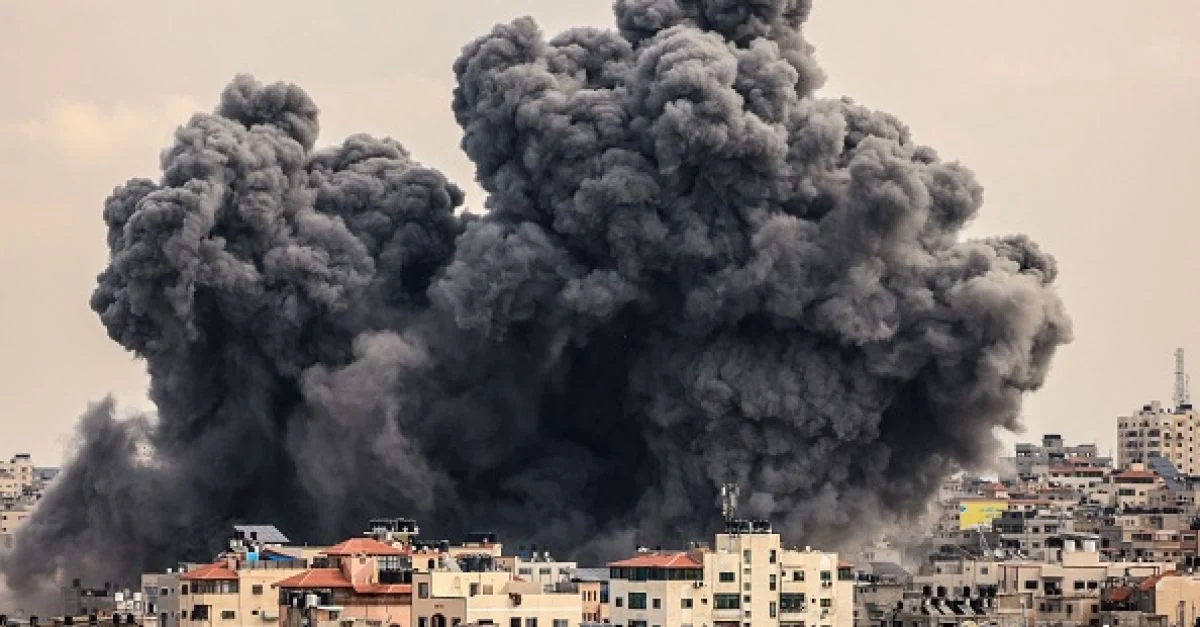Editorial
Israel, Hamas War: Call For Truce

On October 7, there were surprise attacks by Palestinian Hamas terrorists in southern Israel. The attacks,
originating from the Gaza Strip, involved land, sea, and air incursions as well as missile launches, claiming over 1,400 Israeli lives and the capture of more than 203 hostages. These coordinated assaults resulted in retaliatory airstrikes by Israel on Gaza, causing further casualties. The sequence of events has raised concerns about a possible escalation, potentially involving more parties engaged in hostilities.
This onslaught represents the largest number of Jews killed in a single day since the Holocaust, and currently ranks as the third-deadliest terrorist attack of all time, exceeded only by Islamic State massacres in Iraq and Syria, and the 9/11 attacks in the United States. On October 8, Israel declared a state of war for the first time since 1973 and has engaged in a bombing campaign targeting the Gaza Strip, with a ground invasion soon to follow.
Israeli airstrikes have led to the deaths of more than 2,800, with over 3,000 injured, and 650,000 displaced. Unfortunately, the casualty numbers are expected to rise as Israel has begun to deploy additional troops to the Gaza border, signalling the start of what could be a prolonged conflict. At the northern flank of Israel, Hezbollah and Islamic Jihad fighters have begun launching rocket strikes from Southern Lebanon and Syria, with retaliatory strikes from Israeli Defence Forces (IDF). The situation is deeply concerning, and efforts must be made to find a peaceful resolution to prevent further loss of lives and suffering.
The ongoing war in the Middle-East serves as a stark reminder that global peace remains elusive, despite the apparent calm in many regions. The Israel-Hamas confrontation is merely the latest chapter in a complex and longstanding conflict that defies easy resolution. Historical, political, religious, and territorial factors intertwine, resulting in decades of tension, violence, and immense suffering.
Endorsed by the United Nations, the United States and its allies, and backed by pragmatic Arab nations like Egypt, Saudi Arabia, the United Arab Emirates, Qatar, and Kuwait, the creation of autonomous Palestinian two-state entities is seen as a durable, consensus-driven peace solution. This strategy also entails acknowledging Israel’s right to exist within its pre-1967 boundaries and promoting a harmonious cohabitation between the Israel and the Arab nations.
About 21 years ago, Saudi Arabia embarked on a diplomatic endeavour by introducing the Arab Peace Initiative. This proposal successfully brought together Arab states, offering Israel recognition, regional legitimacy, and security in exchange for certain concessions. The blueprint has garnered support from the current US President Joe Biden administration, and most western leaders. The friendly tone of this initiative aims to foster peaceful relations and promote stability in the region. Already, some Arab nations have normalised relations with Israel, with Saudi Arabia at the verge of signing a diplomatic pact with the Jewish state before this bizarre incident.
We unequivocally condemn the unprovoked attacks by Hamas terrorists against Israeli civilians. There is never any justification for terrorism. We extend our condolences for the Israeli lives lost in these attacks, and call for the exercise of utmost restraint while avoiding exposing civilians to further risks. Although it is the right of Israel to defend itself, we warn of serious repercussions as a result of the escalation of violence, which would negatively affect the future of truce efforts.
The world is unfortunately at the beginning of an inevitably protracted war that has already claimed the lives of countless innocent Israelis and Palestinians, with more heavy losses to come. Just on the eve of last Wednesday’s Biden visit to Israel and Jordan, where issues around how to manage the humanitarian crisis were to be ironed out, a hospital holding thousands of displaced and injured Gazans was bombed, killing hundreds, according to Hamas-controlled Ministry of Health. This incident put a wedge on the Jordan leg of the visit, thereby making any interface with Egyptian President, Mohammed Al-Sisi; Palestinian President, Mahmood Abass; and Jordanian King impossible.
Indeed, we cannot overemphasise the fact that there is an urgent need for peace. To achieve lasting peace, it is important to address the root causes of the conflict and ensure the rights and safety of all parties involved. This requires genuine efforts and a comprehensive strategy to end the recurring violence and establish a peaceful future.
Prime Minister Benjamin Netanyahu should be held culpable for the ongoing attacks that Israel is experiencing. Rather than prioritising the vital task of protecting his nation, Netanyahu was engrossed in irrelevant judicial reforms. This preoccupation has resulted in a diversion of his attention from fulfilling his constitutional obligation to safeguard Israel and its people. The prolonged emphasis on these reforms has created a division within the country, as evidenced by the large-scale protests witnessed in recent months.
The two-state solution is the most viable path to lasting peace between Israelis and Palestinians. However, the political and on-the-ground changes in Israel and the Palestinian Territories over the past three decades have made it increasingly difficult to achieve this goal. Israeli and Palestinian leaders lack the necessary resources to engage in productive negotiations and reach a bilateral agreement, making it difficult to achieve a mutually satisfactory resolution.
Thousands of Palestinians are fleeing to already overwhelmed areas in the south of Gaza through unsafe conditions that could especially pose a risk to children, at least, 447 of whom have already been killed in Israeli air strikes since past 13 days. As some families in the northern part of Gaza Strip make their way south with hope of finding a safer place and basic necessities, Israel should observe international laws that are meant to protect children and vulnerable people. The main pillars of protection for children during armed conflict of this nature are the Geneva Conventions.
Allies of Israel and the Palestinians have a critical role to play in de-escalating the conflict, and should take the lead in mobilising the warring parties to the negotiation table. We commend Lebanon for its seeming neutral stance on the conflict, as it consistently expresses its unwillingness to be drawn into the war. The Lebanese government prioritises maintaining security and stability within the country, and it has warned its citizens against making provocative statements.
Egypt, Saudi Arabia, the UAE, Qatar, and other fellow Arab nations should take the initiative to garner international support to facilitate a ceasefire and the resumption of peace negotiations. We warn Iran and its proxies to turn a new leaf, and avoid unprecedented catastrophe that full-scale regional war may unleash. We acknowledge that a large majority of individuals on both sides yearn for peace, therefore, concerted efforts should be made to overcome those who endorse violence. Immediate action should be taken to enforce a ceasefire and ensure the provision of humanitarian assistance.
Those responsible for war crimes should face justice. This includes taking necessary measures to compel Hamas and Islamic Jihad elements in Gaza to release the hostages they currently hold. Israel should distance itself from the hardliners and religious fanatics within their midst who have been violating existing treaties, UN resolutions, and occupying Arab land. These conflicts must be addressed as the world is currently grappling with several such conflagrations, such as the Russian aggression against Ukraine. The war must not escalate any further. The human toll is already enough!
Editorial
Democracy Day: So Far…

Nigeria’s return to democratic rule in 1999 marked a watershed moment in the nation’s political history. After enduring nearly 16 years of successive military dictatorships, Nigerians embraced a new era of civil governance with the inauguration of President Olusegun Obasanjo on May 29, 1999. Since then, the country has sustained a democratic system for 26 years. But, this democratic journey has been a complex mix of progress and persistent challenges.
The formal recognition of June 12 as Democracy Day in 2018 by former President Muhammadu Buhari acknowledged a long-standing injustice. The annulment of the 1993 presidential election, Nigeria’s freest, betrayed the democratic aspirations of millions. That it took decades to honour this date reflects the nation’s complex relationship with its democratic memory.
One of the most momentous successes of Nigeria’s democracy has been the uninterrupted civilian rule over the last two and a half decades. The country has witnessed seven general elections, with power transferring peacefully among different political parties. This is particularly notable considering that prior to 1999, no civilian government had completed a full term without military intervention. The peaceful transitions in 2007, 2015, and 2023 are testaments to Nigeria’s evolving democratic maturity.
Electoral participation, while uneven, has also reflected a level of democratic engagement. In 2003, voter turnout stood at about 69 per cent, but this figure dropped to approximately 34.75 per cent in 2023, according to the Independent National Electoral Commission (INEC). Although the declining turnout raises concerns, it also highlights the increasing expectations of the electorate, who demand credible and transparent elections.
Another area of progress is the growth of a vibrant and free press. Nigerian media has played a crucial role in holding governments accountable and fostering public discourse. Investigative journalism and civil society activism have exposed corruption and human rights abuses. The rise of social media has further expanded the democratic space, enabling young Nigerians to mobilise and advocate for change, as evidenced by the 2020 #EndSARS protests.
Judicial independence has seen mixed results. On one hand, the judiciary has occasionally demonstrated resilience, such as in landmark rulings that overturned fraudulent elections or curtailed executive excesses. On the other hand, allegations of political interference and corruption within the judiciary persist, undermining public confidence in the legal system’s impartiality.
Nigeria’s democracy has also facilitated the decentralisation of power through the federal system. State governments now wield some autonomy, allowing for experimentation in governance and service delivery. While this has led to innovative policies in some states, it has also entrenched patronage networks and uneven development across the federation.
Despite these successes, Nigeria’s democratic journey faces formidable problems. Electoral integrity remains a critical concern. Reports from election observers, including those from the European Union and ECOWAS, frequently highlight issues such as vote-buying, ballot box snatching, and violence. The introduction of the Bimodal Voter Accreditation System (BVAS) and electronic transmission of results in 2023 elections showed promise, but technical glitches and alleged manipulations dampened public trust.
Corruption continues to be a pervasive issue. Nigeria ranks 145th out of 180 countries on Transparency International’s 2023 Corruption Perceptions Index, with a score of 25/100. Democratic institutions meant to check graft—such as anti-corruption agencies and the legislature—often struggle due to political interference and weak enforcement mechanisms.
Security challenges have also strained Nigeria’s democracy. Insurgency in the North East, banditry in the North West, separatist agitations in the South East, and herder-farmer conflicts across the Middle Belt have collectively resulted in thousands of deaths and displacements. According to the Global Terrorism Index 2024, Nigeria ranks as the eighth most impacted country by terrorism. The government’s difficulty in ensuring safety erodes public confidence in the state’s capacity and legitimacy.
The economy poses another critical remonstrance. Nigeria’s Gross Domestic Product (GDP) per capita stands at approximately $2,400 as of 2024, with over 40 per cent of the population living below the national poverty line. High unemployment and inflation have fueled discontent and disillusionment with democratic governance, especially among youth. Without addressing economic grievances, the democratic dividend will remain elusive for many Nigerians.
Ethnic and religious divisions further complicate Nigeria’s democratic consolidation. Politicians often exploit identity politics for electoral gains, exacerbating social tensions. Although federal character principles aim to promote inclusiveness, they have also sometimes fostered a quota mentality rather than merit-based appointments.
Gender representation remains inadequate in Nigeria’s democratic institutions. Women occupy less than 10 per cent of seats in the National Assembly, one of the lowest rates globally. Efforts to pass gender parity bills have faced stiff resistance, highlighting deep-seated cultural and institutional barriers to female political participation.
Civil liberties, while constitutionally guaranteed, are under threat. Crackdowns on protesters, restrictions on press freedom, and surveillance of activists reveal an authoritarian streak within the democratic framework. The controversial Twitter ban in 2021 exemplified the country’s willingness to curb digital freedoms, prompting domestic and international criticism.
The political crisis in Rivers State embodies broader democratic struggles. Attempts to control the state through undemocratic means expose weaknesses in federal institutions and the rule of law. Immediate restoration of democratic governance in Rivers State is vital to preserving Nigeria’s democratic integrity and institutional credibility.
Local governments remain under the control of state governors, depriving citizens of grassroots democracy. Last year’s Supreme Court judgment on local government autonomy is promising, but state-level resistance threatens its implementation. Genuine autonomy would bring governance closer to the people and foster democratic innovation.
As we mark Democracy Day, we must honour the sacrifices of Chief M.K.O. Abiola, Kudirat Abiola, Femi Falana, Chief Gani Fawehinmi, Pa Alfred Rewane, President Bola Tinubu, and countless others, who fought for Nigeria’s freedom. As democracy in Nigeria continues to evolve after 26 years, this day should inspire action toward its renewal. With despotism and state failure as real threats, both citizens and leaders must take responsibility—citizens by demanding more, and leaders by delivering. Excuses are no longer acceptable.
Editorial
Nigeria’s Plastic Pollution Emergency

Yesterday, Nigeria joined the rest of the world to mark 2025 World Environment Day. The occasion serves as a stark reminder that our battle against plastic pollution requires more than symbolic gestures—it demands sustained, coordinated action from all levels of government. As communities worldwide grapple with mounting environmental challenges, Nigeria’s approach to plastic waste management stands at a critical juncture.
Dr. Ibinabo Ogolo, a Research Fellow at the Institute of Geosciences and Environmental Management at Rivers State University, has issued a timely call for comprehensive enlightenment campaigns targeting indiscriminate plastic waste disposal. Her message resonates with the urgency that characterises this year’s global theme: “Beat Plastic Pollution.”
The core challenge lies not in policy formulation but in implementation. Years of environmental initiatives have fallen short primarily due to inadequate public education and awareness campaigns. Citizens cannot be expected to adopt responsible waste disposal practices without understanding the gravity of their actions or knowing the proper alternatives.
Government platforms at federal, state, and local levels possess the infrastructure necessary to reach every corner of our society. Television, radio, social media, community meetings, and educational institutions provide ready channels for sustained messaging. The tools exist; what remains is the political will to deploy them effectively and consistently.
This year’s World Environment Day theme underscores the global recognition of plastic pollution’s devastating impact on ecosystems, wildlife, and human health. The message is clear: plastic waste represents one of the most pressing environmental challenges of our time, requiring immediate and sustained attention from policymakers and citizens alike.
The health implications of plastic pollution extend far beyond environmental aesthetics. Industrial and medical plastic wastes often contain toxic chemicals with carcinogenic properties, posing direct threats to human health. These materials don’t simply disappear when improperly disposed of-they infiltrate our environment, contaminating soil, water sources, and food chains.
Plastic additives released into the environment create a cascade of contamination that affects entire ecosystems. Wildlife suffers through ingestion, entanglement, and habitat destruction, while humans face exposure through contaminated water, food, and air. The interconnected nature of these impacts demands a comprehensive response that addresses both immediate disposal practices and long-term prevention strategies.
The link between plastic pollution and serious health conditions, including breast, ovarian, liver, and lung cancers, as well as various hormonal disorders, underscores the urgency of public education campaigns. Citizens have the right to understand how their daily choices affect not only environmental health but their own well-being and that of their families.
Despite scientific awareness of ocean plastic pollution dating back approximately 50 years, Nigeria’s rivers, creeks, and waterways continue to suffer from plastic waste invasion. This represents a failure of sustained commitment rather than a lack of knowledge about the problem’s existence and solutions.
The ritualistic approach to World Environment Day celebrations must end. Annual speeches and symbolic cleanups, while valuable, cannot substitute for year-round, systematic efforts to change behaviour and protect our environment. Governments must develop comprehensive frameworks that extend beyond June 5th commemorations.
Sustained enlightenment campaigns require dedicated funding, clear messaging, measurable objectives, and regular evaluation. Success depends on consistency, creativity, and community engagement that transforms environmental protection from a government mandate into a shared cultural value.
The path forward demands that all stakeholders-government officials, community leaders, educators, and citizens-recognize their roles in combating plastic pollution. Only through sustained, coordinated efforts can we hope to achieve the behavioural changes necessary to protect our environment and secure a healthier future for generations to come.
Editorial
2025 UTME: Lessons, Concerns

The recent uproar surrounding the poor performance of students in the 2025 Unified Tertiary Matriculation Examination (UTME), alongside growing distrust in the Joint Admissions and Matriculation Board (JAMB), has sparked nationwide concern and regional tensions.
JAMB’s published results reveal a troubling trend: over 75 per cent of candidates scored below 200 out of 400. This marks a continuation of a steady decline in performance since 2020. The Minister of Education, Prof. Tunji Alausa, attributed this decline largely to the shift toward the Computer-Based Test (CBT) format introduced by JAMB.
Yet the crisis extends beyond widespread low scores. A total of 379,997 candidates-primarily from South-East Nigeria and Lagos State-were reportedly affected by technical glitches and human errors. These issues rendered their results invalid. In a rare public admission, JAMB Registrar, Professor Ishaq Oloyede, broke down in tears at a press conference, accepted responsibility, and announced a makeup UTME scheduled from Friday, May 16 to Monday, May 19, 2025.
However, the decision to reschedule the exam on short notice has drawn criticism. Many argue that the affected candidates, already emotionally distressed, were not given sufficient time to prepare. The Board’s plan to inform them via bulk SMS-a method known for its 50-60 per cent delivery rate-was also seen as inadequate, potentially excluding half of those impacted. Critics argue, JAMB should have either extended the resit period or leveraged digital answer scripts for regrading-unless, of course, such retrieval technology is unavailable.
Multiple factors likely contribute to the consistent underperformance of UTME candidates, yet the nation has seemingly accepted this dismal trend as standard. Each year, JAMB meets with university vice-chancellors, and low results are normalised. Consequently, universities scramble to admit the 25 per cent who scored above 200, often lowering their standards to fill quotas. This is especially evident in the profit-driven expansion of private universities.
The 2025 UTME debacle has exposed long-standing systemic flaws. Embracing digital-only exams demands greater readiness-both from service providers and from candidates. Reports from CBT centres include system malfunctions, frozen screens, login errors, and lost answers. Some candidates were unable to navigate subjects or submit their tests. These failures were beyond their control.
Whether due to technical incompetence or deliberate sabotage, the damage is clear. Some speculate that JAMB or its leadership-particularly Prof. Oloyede-may have been targeted. Over the past nine years, Oloyede has returned billions of naira in surpluses to the national treasury, earning both praise and scrutiny. While JAMB is not a revenue-generating agency, this unusual financial transparency has boosted its public image.
Despite this crisis, Prof. Oloyede showed commendable leadership, accepting responsibility, and taking immediate corrective action. The priority now must be to implement lasting solutions that prevent future failures. Leadership must be both principled and responsive to the public outcry.
Beyond the technical breakdowns and poor performance statistics, the UTME crisis had a tragic human cost, with at least one student reportedly taking their own life. Widespread irregularities have undermined trust in Nigeria’s educational meritocracy, reducing years of student effort to nothing.
The use of flawed software systems lacking safeguards has had catastrophic consequences. Essential reforms must include external audits, system redundancies, and real-time monitoring. JAMB’s initial poor communication only deepened public anxiety, underlining the need for greater transparency and independent oversight.
What is required now is a complete overhaul of JAMB’s technical infrastructure and a new communication strategy grounded in empathy and student welfare. Broader systemic reforms must follow, including more inclusive admission criteria and better support structures for students.
This crisis presents an opportunity-a solemn one-for sweeping reforms that centre students’ needs. Transformative action must be taken, not just in response to this scandal, but in honour of the life lost and to restore public trust.
Finally, an urgent and impartial investigation must uncover the true causes of these failures. Those found culpable must be held accountable. If we move forward without consequences, both JAMB’s reputation and that of its leadership may suffer irreparable damage.
-
Niger Delta5 days ago
PIA: Bayelsa Engages Oil Firms, Dev Trusts On Transparency …Set To Issue New Operation Guidelines
-

 News5 days ago
News5 days agoFG Working Towards World-Class Public Service -Walson-Jack
-
Rivers5 days ago
450 Varsity Admins Undergo Specialised Training On Nigeria’s Higher Education
-

 Sports5 days ago
Sports5 days agoTeam USA Booed After Another Whipping
-
Politics5 days ago
Ex-Minister Cautions Eno Against Forcing Lawmakers To Join APC
-

 News5 days ago
News5 days agoKing Daukoru commends Tinubu for prioritising welfare of oil communities
-
Business5 days ago
Customs Gives Jet Owners One Month To Clear Debt
-

 News5 days ago
News5 days agoFIRS Introduces New SOP To End Tax Confusion Nationwide

